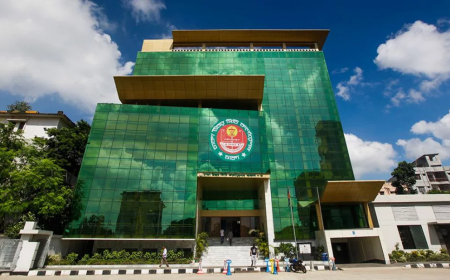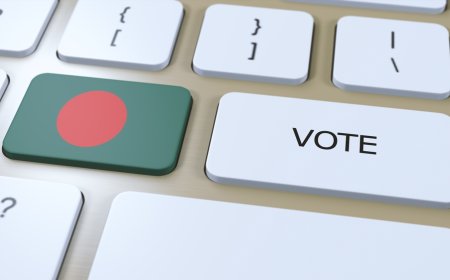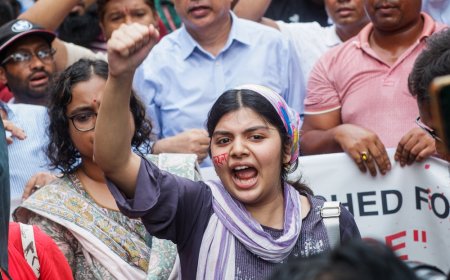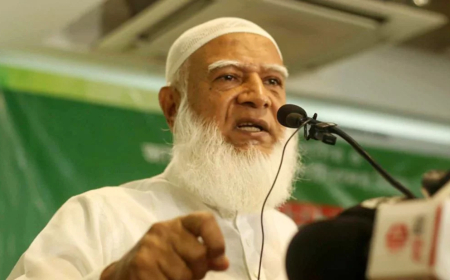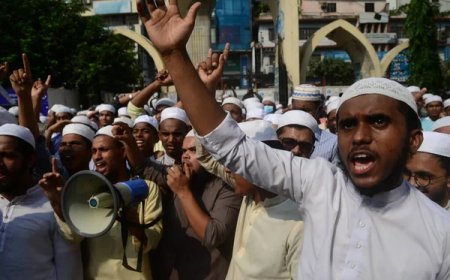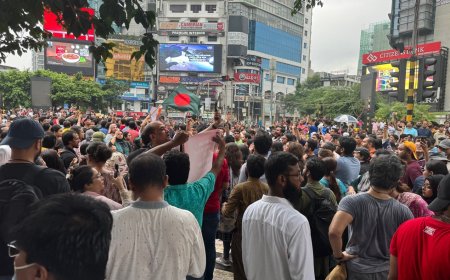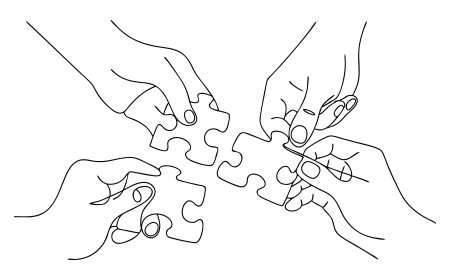Ringing Out the Old, Ringing in the New
The conventional view of politics is an old-fashioned journey

After August 5, a new political force emerged as a challenge and a future threat to the existing political system, which was based on a political contract among the old political parties.
Professor Razzaq explains in his unfinished doctoral thesis that the political culture originating from the struggle to overthrow colonial forces before 1947 was simply an attempt to seize the power vacuum left by colonial rule for economic gain.
As soon as the subcontinent split into two or three countries after 1971, the political mindset was shaped by a sense of ownership of the state -- not aimed at providing public service but at gaining personal benefits and sharing power among interest groups.
The lack of a long political history and a quick victory over their colonial forces, driven by the desire for self-rule, led to the parties focusing mostly on religious and cultural issues.
Such a political journey, driven by identity issues, fostered undemocratic traits from the start. Political parties could hardly develop positive economic programs instead of engaging solely in identity politics to win elections, which only widened social divisions.
This fueled desires for material wealth, vanity of status, and a need to control others.
An additional undemocratic feature emerged in decision-making, as all power was concentrated in the party leader, leading to tendencies toward centralization even during the formation of the All-India Congress Party.
Therefore, politics not only vested all power in the top leader but also created pathways for dynastic politics. As a result, only interest-based politics thrived, and democracy faltered without viable alternatives, thrusting the nation into an unprecedented event: A powerful political force vanishing like vapour.
The emergence of the recent student political party after August 5 is seen as an unconventional movement against established practices and culture.
Was it better for this new force to stay as a pressure group or to get directly involved in politics?
The debate overlooks the fact that the force that unified the entire nation before August 5 was based on a shared goal of removing the fascist regime, a goal supported across all factions regardless of age, gender, religion, or political identity.
After August 5 and the formation of a new government, keeping the nation united on any issue other than establishing a true republic becomes impossible. In reality, various political groups with different interests have seized the opportunity to promote their own visions of democracy.
The rejection of traditional politics is hard to accept, and any alternative route to power is equally unacceptable. The conventional view of politics is an old-fashioned journey that must include a prominent figure, a political theme, and dynastic identities.
The rise of a new political force sparks curiosity among others, as they may not support politics that our traditional political mindset accepts.
A group of young, unknown individuals who gained popularity after August 5 and suddenly become significant in national politics is itself difficult for an established political order to accept. What alternative does this new political force offer?
Do they speak not just for themselves but for the people, and focus on serving the public interest? Is their politics inclusive and aimed at empowering all, rather than benefiting a few?
Do they engage in vigorous debates on political issues but avoid the traditional hand-to-hand combat within their own ranks or with others?
Do they refrain from going to business circles to claim money for dubious future commitments?
Do they frequently change their decisions because they lack a centralized top-down authority to enforce unquestioned ideas?
Do they identify genuine friends and enemies and resist any corrupt influence?
Do they dare to participate in TV debates without claiming that only their ideas are the best?
Do they accept criticism graciously and explain their positions as clearly as possible?
Answers to all of these lie in the fact that perhaps they dont fear to pronounce the name of Vashur, unlike the powerful intelligentsia who have moved like nomads from court to court across the country for the same.
Maybe they do not fear criticizing their chosen head of state whenever they feel aggrieved by a decision, rather than keeping it unquestioned as a holy figure. They might not create any traditional political narrative, such as the spirit of liberation or that of any religion, but rather aim to build one grounded in what people demand.
They probably dont want to make false promises; instead, they prefer to prove it through action. They may not want to dress like the Jorasako family or the Saudi sheikh family, nor do they trace their cultural origins to either.
They might not want to copy traditional politics; rather, they desire to invent new politics.
They probably don’t deny history but prefer not to treat it as Vedic mythologies, unable to adjust to new realities. They might not resort to diplomatic pretension to define what is good or bad for their own nation.
They perhaps don’t consider themselves a weak nation surrounded by a big neighbour, and they dont see their shadow as imperative to national politics.
Interestingly, the alternative political approach they develop makes it ironic that the age of their party, the age of their members, and their numerical weakness do not weaken them but instead make them a bargaining force in politics -- one that nudges both major parties to adapt.
The most liberal political analysts look down on them as a party of the circus, while the more conservative ones, especially in religiosity, demand patriarchal respect rather than equal treatment.
TV show heroes constantly demean these new forces for lacking maturity, both biological and political, despite the fact that no political group has delivered anything for the Republic, which was established through a bloodbath.
Some do not shy away from undermining them for coming from a background that isn't conducive to running national politics beyond the elite circle.
The most ironic fact is that traditional political minds fail to read the pulse of a generation already aware of its own nation, politics, and global realities.
They do not dream while asleep, don’t have goldfish memories, walk in a straight, steep line rather than in circles, and carry a constitution in their hearts to fulfill the aspirations of citizens, without caring about the systemic pressure of the colonial hangover.
Brigadier General AF Jaglul Ahmed (Retd) is a regular contributor to national dailies. He can be reached at [email protected].
What's Your Reaction?












